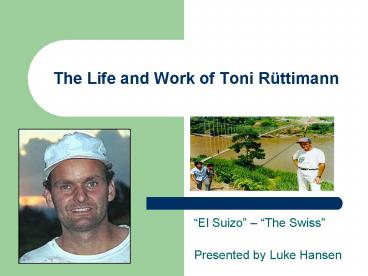The Life and Work of Toni Rttimann - PowerPoint PPT Presentation
1 / 18
Title:
The Life and Work of Toni Rttimann
Description:
Who is Toni 'the Swiss'? Toni the Swiss is a humanitarian civil engineer and bridge-builder ... With limited means, he spearheads ambitious projects throughout ... – PowerPoint PPT presentation
Number of Views:36
Avg rating:3.0/5.0
Title: The Life and Work of Toni Rttimann
1
The Life and Work of Toni Rüttimann
- El Suizo The Swiss
- Presented by Luke Hansen
2
Who is Toni the Swiss?
- Toni the Swiss is a humanitarian civil engineer
and bridge-builder - His mission Improving the daily lives of
impoverished populations by building bridges - With limited means, he spearheads ambitious
projects throughout Latin America and now Asia
3
How did Toni get started?
- 1987 Voyaged to Ecuador after an earthquake he
saw the devastation after bridges were destroyed - Became determined to build sustainable pedestrian
bridges throughout Latin America and the
developing world - Developed a method to construct suspension
bridges by hand with community involvement and
donated materials
4
Suspension footbridge in Kampong Pil,
Cambodia Completed 2001, 93 m span
5
How does Toni choose sites?
- Toni evaluates villages that are suffering for
lack of a bridge. - Toni engages the communities in implementing
bridge projects. - The personal involvement of community members
ensures the success and long term sustainability
of the project.
6
Who has benefited from Tonis bridges?
- It is estimated that Tonis bridges have improved
the lives of over 600,000 people. - Toni has built bridges in Nicaragua, El Salvador,
Mexico, Colombia, Costa Rica, Ecuador, Cambodia,
Vietnam
7
Toni community members constructing a bridge in
Latin America
8
What types of bridges does Toni build?
- Toni builds pedestrian suspension bridges.
- Typical span of 50 to 100 m
- The longest span is 264 m
- Toni has constructed over 230 of these bridges
9
Why suspension bridges?
- Suspension bridges can be constructed relatively
cheaply compared to other bridge types. - Bridge elements can be fabricated off-site and
quickly erected. - Bridges can be constructed without heavy lifting
equipment.
10
San Miguel, Honduras 80 m span
11
Santa Barbara, Honduras74 m span
12
How much does a bridge cost?
- Toni says his organization pays 500 for each
bridge (mostly for transportation) - Other materials (wood, concrete) are provided by
the communities (approx. 500 value) - Oil companies and armies sometimes provide
transportation services
13
What materials does Toni use?
- Tonis suspension bridges are constructed with
steel pylons and steel cables. - Much of the materials are piping and cables that
have been discarded by the oil industry. - All other materials are provided by the
communities benefiting from the bridge
14
Tonis Implementation Method Transportation
Labor
- Transportation
- Bridge materials are transported to the site by
truck and then carried on the backs of helpers - Labor
- Tonis labor force comes from the surrounding
community. People help by cutting wood, carrying
stones, and more
15
Tonis Implementation MethodTimeline
- Planning
- Bridge layout is planned and marked
- Excavation
- Community members excavate for foundations and
gather sand and stone for concrete - Tower fabrication
- Bridge elements are usually welded off-site by
Tonis assistants
16
Tonis Implementation MethodTimeline
- Erection
- Towers are erected in foundations and set in
concrete - Cables
- The main cables are strung and hangers are
clamped on. - Deck
- The bridge deck is assembled from wood cut by
the community members
17
Tonis assistant Walter welding a bridge anchor
18
Sources
- Overview
- http//www.mostypolskie.pl/Abstracts/0120Introdu
ction20and20scope/Ruttimann.pdf - Kampong Pil Bridge http//www.structurae.net/stru
ctures/data/index.cfm?IDs0005218 - Building Bridges of Hope, Recovery, and Love
- http//web.archive.org/web/20040217193011/cleo.en
g.monash.edu.au/articles/Ruttimann.htm - Toni El Suizo
- http//epcollines.ecolevs.ch/sitetoni.htm
- Sigus News
- http//web.mit.edu/sigus/www/NEW/news.htm































